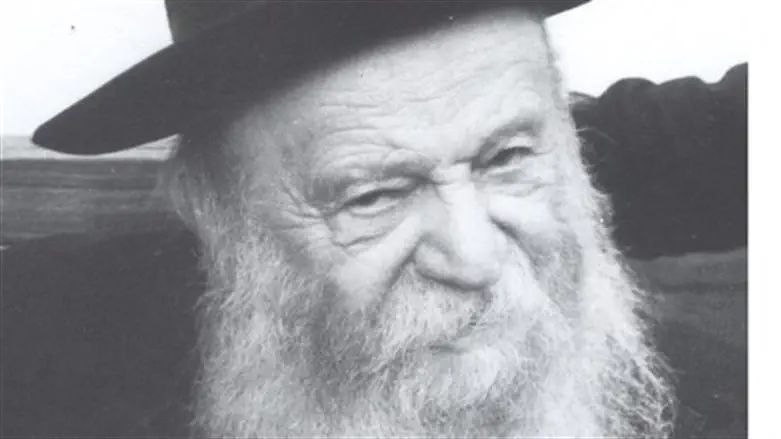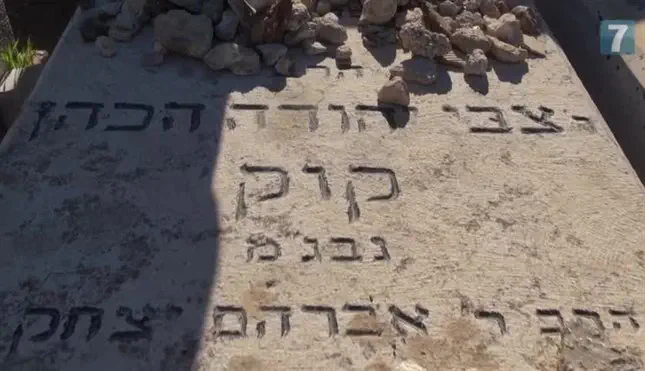
The return of Jewish communities to Judea and Samaria in Israel did not start on the windswept of hills of that biblical heartland, but in a small apartment in the Geula neighborhood of Jerusalem, in the modest home of HaRav Tzvi Yehuda Kook, head of the Mercaz HaRav Yeshiva and son of HaRav Avraham Yitzhak HaKohen Kook.
In addition to the classes he taught in the yeshiva, students visited his home for classes in Emunah and in the prolific writings of his father, Rabbi Kook, who taught the early pioneer generation to see the Divine Hand in the return of Am Yisrael to Eretz Yisrael and in the rebuilding of Jewish Nationhood in Zion.
Known as the “Father of the Settlement Movement” he passed away on Purim 43 years ago at the age of ninety-one.
"Often, out of awe for his father, HaRav Tzvi Yehuda would simply read the text of his father’s writings, without offering any commentary on his own,” recalls Rabbi David Samson, a twelve-year student of HaRav Tzvi Yehuda and author of the book, “Torat Eretz Yisrael,” on the Rosh Yeshiva’s teachings.
As the question of Israeli sovereignty over Judea and Samaria is once again making its way into the news, I asked Rabbi Samson to capsulize the teachings which inspired students, such as Rabbis Hanan Porat, Moshe Levinger, Haim Druckman, Dov Lior, Zalman Melamed, Shlomo Aviner, Eliezer Waldman, and many more Rabbis and Roshei Yeshivot today to leave the Mercaz HaRav Yeshiva and become the pioneer settlers who created the “facts on the ground.” They built Jewish communities in Hevron, Bet El, Elon Moreh, Ofra, Kfar Etzion, Kiriat Arba, Gush Katif, and the moshavim of the Golan – thriving, peaceful Jewish communities which the world calls “obstacles to peace.”
Isn’t it unusual for a Rosh Yeshiva to tell his students to close their Talmudic tractates and grab shovels and hammers in order to establish new communities all over the country?
Rabbi Samson: HaRav Tzvi Yehuda didn’t tell students specifically to leave the yeshiva. Everyone understood from his teachings that this was the commandment of the hour. Students would come to his home and tell him that they wanted to start a new community in Samaria or along the Gaza border, and he would give them his blessing as a Kohen. For him, building communities in the Land of Israel was the natural extension of Torah learning, just as Yehoshua’s conquest of the land was a natural continuation of the Torah which the Jewish People received at Sinai.
He often noted that the words ‘yeshiva’ and ‘yishuv’ (settlement) have the same root, and emphasized that building new communities was not ‘bitul Torah,’ but Torah itself, in fulfillment of the Hashem’s repeated command to settle the Land and keep it under Jewish sovereignty. For him, each new home was the fulfillment of the Divine prophecies which envisioned the day when the blighted and desolate homeland would blossom and be resurrected to life. Often, he himself accompanied his students to the hilltops of Judea and Samaria to plant the first sapling as his children erected tents and dragged generators and building materials to the site.”
His children?
His students. HaRav Tzvi Yehuda didn’t have children of his own. His students were his children. Hundreds of budding Torah scholars revered him as a father. Interestingly, when students speak about him, whether they turned out to be Roshei Yeshivot, army commanders, teachers, physicians, or Knesset members, each one will tell you that he had a special relationship with Rabbi Kook. He made each of us feel like a beloved child. And he taught us to love every Jew with an unlimited love, whether he or she was secular or Haredi.
Can you recall a personal experience that illustrates the feeling of closeness that the Rosh Yeshiva managed to establish with his students?
In the month of Elul, at the very beginning of each year, HaRav Tzvi Yehuda would lecture about Emunah and the vital importance of approaching Torah learning from the point of view of the whole, the Clal, in its national aspect, as the Torah of the Nation, in all of its facets. On the very first day of my learning at Mercaz HaRav, I fell ill and missed the opening lecture. A few days later, when I recovered, I took a place in the line of students who always waited to ask the Rosh Yeshiva questions at the conclusion of morning prayers. When my turn came, I told HaRav Tzvi Yehuda that I had been sick and missed the opening lecture. To my surprise, he sat me down, asked how I was feeling and inquired about the details of my illness. Then for nearly an hour, while other students were waiting, he explained the class I had missed. He took the time to go over the entire initial lesson with me alone.
Did his love for his students and for the Jewish People extend to the non-Jews in Israel as well?
Like his father’s renowned love for all mankind, his love extended to everyone. If he heard about an incident where an Arab was treated unfairly, on several occasions he sent off a letter to a newspaper to voice his displeasure. But he would always stress that our respect for our non-Jewish neighbors did not extend to granting them any sovereignty whatsoever over Eretz Yisrael. He repeatedly stated that Arabs were welcome to live peacefully alongside the Jewish People in the country, but that they could not have any national rule here. He said that if they couldn’t be persuaded with words we would persuade them with our tanks.
Today, if the Government of Israel were to agree that some kind non-Israeli peace force can rule over Gaza in order to secure a peace agreement, how would this fit in with Rabbi Kook’s belief that the promised Redemption is unfolding via the events of our times?
First of all, HaRav Tzvi Yehuda emphasized that all expressions of surrendering territory were as strictly forbidden as eating pork. In a time of war, he said, expressions of weakness are anathema to the strengthening of the Nation. He said that we must guard against language which leads to discouragement and a weakness of heart, in line with the Torah’s commandment to soldiers not to melt the hearts of their brothers because of their fears. We are not to be afraid the Gentile nations, nor give in to their demands. All proposals of withdrawal, autonomy, and foreign sovereignty over the smallest part of the Land of Israel are treif, not kosher, he said, and must be adamantly avoided. Just as no letter of the Torah is allowed to be erased, and no Jew is allowed to be abandoned.
HaRav Tzvi Yehuda vehemently maintained that no handful of Israeli soil, however small, is allowed to be transferred to foreign control. He taught that we must strengthen our rule over Israel, in all of its borders, and that all interference on the part of the Gentiles is null and void.
If he were still with us, what would his message be to world Jewry today?
HaRav Tzvi Yehuda stressed again and again that living in Eretz Yisrael was a fundamental commandment of the Torah and that every Jew should dwell here. He made this especially clear when he met with groups of Bnei Akiva youth from the Diaspora. He told them, “We are the Nation created by Hashem to proclaim His Name in the world. And just as all other Nations belong to a particular Land, we belong to a particular Land. This is part of the order of Creation that this air, these mountains and hills, these stones and plants in this portion of the globe are uniquely connected to us.
Because of our long exile amidst the impurity of the gentile Nations, we have become accustomed to think that our life in the Diaspora is normal, and we forget that Eretz Yisrael is our natural, healthy, Divinely-intended place. Our Sages teach us that the air of the Land of Israel makes one wise (Baba Batra 158B). It causes intelligence and wisdom. And the beginning of intelligence is to understand that existence among the gentile nations is totally unfeasible.
We mustn't forget that the gentile nations do us a favor by allowing us to stay in their Lands - until they expel us. One must realize that we are on foreign soil there. It is not our society, nor government, nor culture. Nothing is ours. Only in Israel are we at home with family, living according to our customs, and our uniquely Jewish year, living in the one place designed for our holiness, for our psychological health, even for our physical wellbeing.
We must return to health and turn away from polluted, unhealthy places, from environments that sometimes are so polluted and disorienting that a Jew forgets who he really is and thinks that it is normal to live amongst the gentiles. This is a tragic mistake.”
May the memory of this Tzaddik be blessed.
